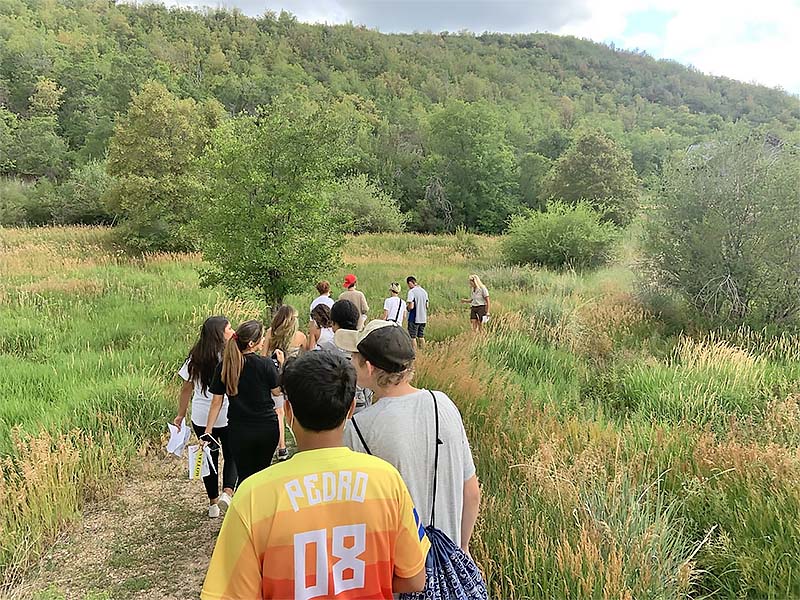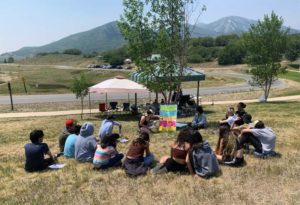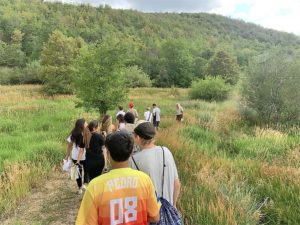



By Francisco Rendon
Middle-schoolers from the Salt Lake City area trooped into the great outdoors this past summer for the first eco-camp in several years organized through the junior youth spiritual empowerment program.

Youth and supporting agencies in a two-county cluster of communities organized the day camp in two Wasatch County parks July 22-24 for 20 junior youth participants ages 12-14. Attendees met at the local Baha’i Center each morning, then piled into cars for a 45-minute trip to one of the parks to study the text “Observation and Insight.” The book follows a fictional character as she uses science and religion to observe the world around her and starts to ask questions about physical and social realities.
Even with temperatures rising over 100 degrees, the junior youths studied the entire text over the three days and carried out complementary activities. One exercise helped them learn to classify different trees based on their characteristics. They also created mandalas, pulled weeds as a service project and swam.
Regional junior youth coordinator Layla Latu praises the preparation the animators (junior youth group mentors) put in over several weeks, including a special focus on key concepts and planning of the activities. She says it made study very efficient and it was the first time she had seen a group of junior youth complete a full text at one camp.
“I think preparation really helped create an uplifting space where the youth [animators] themselves felt very confident in the material and in delivering it. I think that helped alleviate a lot of stress that you can sometimes feel when facilitating this kind of space…and that created a sense of joy.”
Riley Finnegan, a former junior youth coordinator for the area, originally shared the idea of eco-camps when she moved to Utah from Medford, Oregon, in 2014. Others locally involved in the junior youth program liked the idea.
Eco-camps are one kind of space recommended in the training of animators. “In Oregon, when I was a junior youth, one summer there was a massive campaign of junior youth eco-camps and I thought they were great,” Finnegan says. “So when I moved to Salt Lake, I remembered the huge impact it had on me as a junior youth, so I said ‘Let’s try it here.”
Previous eco-camps were staged in 2014, 2016 and 2017, then went on hiatus until 2021. Although she is no longer serving as a coordinator, Finnegan says she still enjoys organizing these kinds of camps as a service.


In addition to 20 junior youth participants and four animators, eight youths participated in the study and activities, three adults provided on-site support and four more adults offered transportation and food.
That kind of support, as well as preparation by the animators is a big part of why the camp was so successful, Finnegan says.
“A culture has been developed over the years of adults supporting youth. The youth are the ones putting the camp on, but the adults are there to help clean up after lunch when the schedule demands they move on,” Finnegan says. “The adults aren’t overbearing or trying to take over. They respect the animators and have trust and faith in their ability.”
While the numbers of youth and adults supporting the camp was almost equal to the number of junior youths attending, Latu says it never felt like there were too many cooks in the kitchen. Everyone had a role to play.
This eco-camp fits into a larger rhythm of camps and junior youth summits being organized in the Salt two counties, Latu says. A broader object of learning across the Four Corners region — which also includes Arizona, Colorado, Nevada and New Mexico — is how to use these larger gatherings to strengthen smaller junior youth groups that meet regularly in various neighborhoods.
One more noteworthy aspect of the camp, Latu says, was a reflection space at the end where junior youths were asked about their roles in helping to preserve the environment. They were invited to write their responses on sticky notes.
Finnegan says the exercise successfully engaged the junior youths in individual and collective reflection, and she feels many of them came away with a greater understanding of their responsibility to care for the natural world.


![]()
![]()
Whether you are exploring the Bahá'í Faith or looking to become an active member, there are various ways you can connect with our community.
Please ensure that all the Required Fields* are completed before submitting.